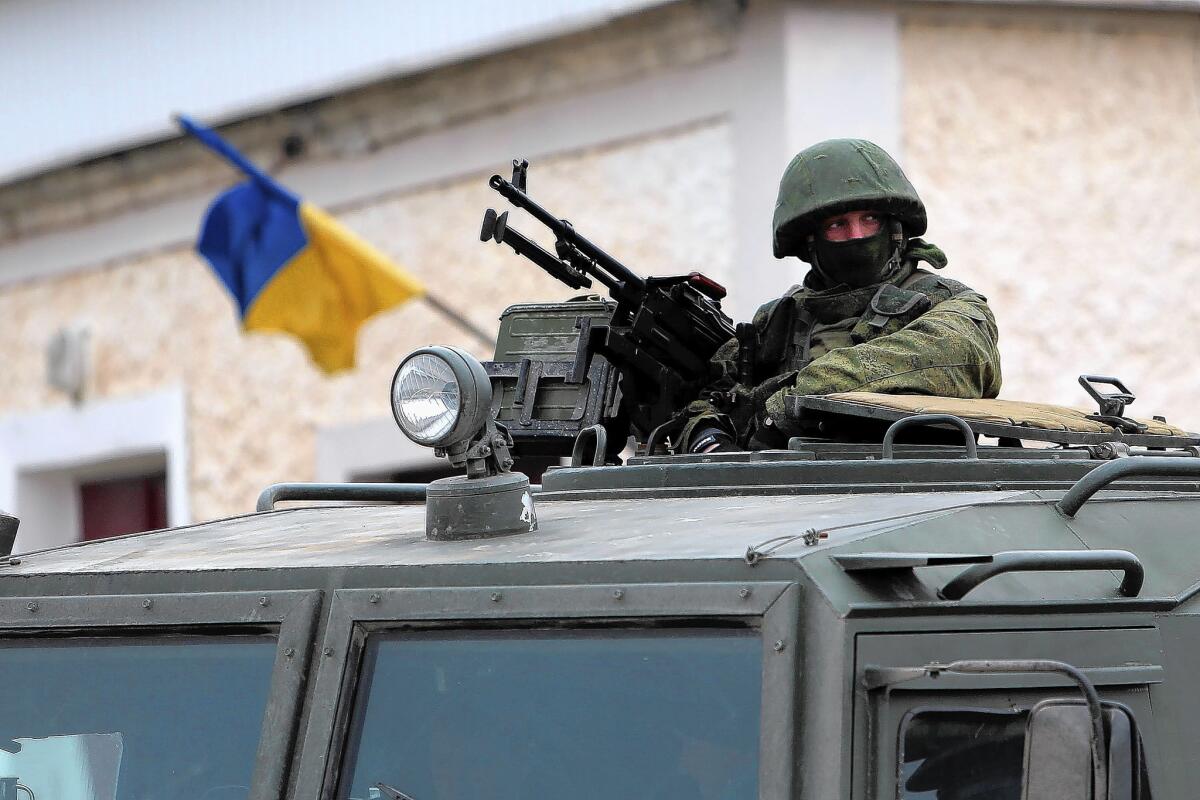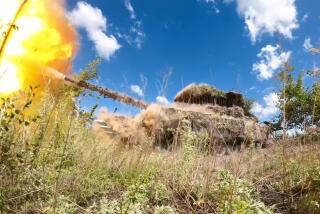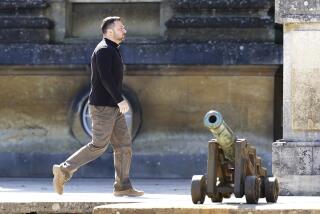Crimea lawmakers say secession possible only by referendum

MOSCOW — Ukraine’s Crimea region would become an independent country if voters approve secession in a hastily organized referendum Sunday, the Russian-controlled regional parliament declared Tuesday in a shift away from plans for immediate annexation to Russia.
The change appeared to mark a change in strategy by Moscow to shield itself from accusations that it has orchestrated an illegal seizure of another country’s territory.
European Union and U.S. officials have threatened trade and travel sanctions against Russia if it persists in encouraging the predominantly ethnic Russian-populated Crimean peninsula to vote for cleaving itself from Ukraine. A tense international standoff has ensued after Russia sent troops into Crimea. Moscow and Crimean nationalists contend that the interim leaders in Kiev pose a threat to Ukraine’s ethnic Russian minority, which accounts for about 17% of its population of 46 million.
Ukraine’s interim government leader, Prime Minister Arseny Yatsenyuk, was headed to Washington for talks with President Obama on Wednesday. Yatsenyuk complained to Ukrainian lawmakers Tuesday that he was unable to get in touch with Russian President Vladimir Putin or Prime Minister Dmitry Medvedev to discuss ways to avert an escalation of the crisis, as United Nations and Western diplomats have urged since Russian troops seized the peninsula two weeks ago.
International law experts have noted that the Ukrainian Constitution requires any changes in territory or borders to be voted on by the entire country. A 1994 agreement signed by Russia and Ukraine under international brokerage also suggests Western powers protect Ukraine from aggression by its neighbor.
Putin and Kremlin-controlled media have cast the ouster of pro-Russia Ukrainian President Viktor Yanukovich as an illegal overthrow by “fascists” and “criminals.” A three-month protest drove Yanukovich to flee the country on Feb. 21.
The Crimean parliament voted Tuesday to ban “nationalist political organizations” involved in the recent leadership turmoil in Kiev, Ukraine’s capital, from taking part in Sunday’s secession vote, the RIA Novosti news agency reported.
The legislation specified two nationalist parties, Svoboda and Right Sector, but also authorized security forces to detain and prosecute “anyone suspected of inciting ethnic hatred and calling for violence.” It was unclear how Crimean authorities planned to identify and disenfranchise those who will be ineligible to vote on the future of the Ukrainian region that hosts Russia’s Black Sea fleet and its warm-water ports.
Thousands of pro-Russia demonstrators have turned out for rallies in support of secession from Ukraine. Video from Western news agencies showed security forces pouncing on the few protesters attempting to display Ukraine’s blue-and-yellow flag or placards professing loyalty to the government in Kiev.
Earlier Tuesday, Yanukovich appeared on television from the southern Russian city of Rostov-on-Don to accuse the interim leadership that succeeded his government in Kiev of pushing Ukraine to the brink of armed conflict.
It was only the second time since Yanukovich fled that he has been given a public platform in Russia, where he sought refuge from the hordes of protesters angered by his unilateral decision to break off talks with the European Union on an association agreement. Yanukovich pulled Ukrainian diplomats out of a three-year negotiation with the EU aimed at boosting trade and cooperation, instead favoring closer ties with Moscow.
“They want to put the [Ukrainian] army under a flag of [nationalism] and unleash a civil war,” Yanukovich said of the interim leaders. “They want to include fighters from nationalist organizations in the armed forces and hand them guns.”
Yanukovich, who insisted again that he remains the legitimate president of Ukraine, is wanted on a warrant issued in Kiev last month accusing him of mass murder in the deaths of scores of demonstrators killed by his elite riot police.
Crimea’s pro-Russia authorities have announced plans to nationalize Ukraine’s navy vessels and bases in the event of independence. Their statement came as Russia reportedly beefed up its military presence in the peninsula, bringing in new troops and military hardware while continuing to blockade the remaining Ukrainian army and navy units in Crimea.
Russia has deployed a force of 220,000 troops, 1,800 tanks and more than 400 helicopters close to Ukraine’s border. Ukraine has about 41,000 troops, of which only 6,000 were “combat ready,” Ukraine’s acting defense minister, Ihor Tenyukh, told the national parliament Tuesday, UNIAN news agency reported.
Yatsenyuk, in his meetings in Washington, is expected to ask for aid for his country’s armed forces. But U.S. officials, speaking anonymously in discussing internal deliberations, said they were continuing to focus instead on using sanctions and diplomatic pressure to persuade Russia to pull back from Crimea.
Air Force Gen. Philip M. Breedlove, the senior commander at the North Atlantic Treaty Organization, said Tuesday that he had held a “productive” call with the chief of Ukraine’s armed forces, Lt. Gen. Mykhailo Kutsyn.
Breedlove said on Twitter that they had “discussed ways to expand partnership of NATO and Ukraine.”
Another senior officer said the U.S. and its European allies were “looking at options” for helping Ukraine, including possible sharing of intelligence and advice to its armed forces. There is “nothing solid yet,” he said.
In Washington, the House overwhelmingly agreed Tuesday to condemn Russian military action in Ukraine, a vote that provided more symbolism than substance. The resolution won bipartisan backing on the eve of Yatsenyuk’s visit, during which he is expected to meet with House and Senate leaders as well as the president.
Yet Congress has struggled to provide $1 billion in loan guarantees for the new Ukrainian government or slap additional sanctions on Russia beyond those imposed last week by the White House. The House-passed loan package has slowed in the Senate as Democrats consider attaching separate funding for the International Monetary Fund that many Republicans resist.
Loiko reported from Moscow and Williams from Los Angeles. Lisa Mascaro and David S. Cloud in the Washington bureau contributed to this report.
es. Lisa Mascaro and David S. Cloud in the Washington bureau contributed to this report.
More to Read
Sign up for Essential California
The most important California stories and recommendations in your inbox every morning.
You may occasionally receive promotional content from the Los Angeles Times.











